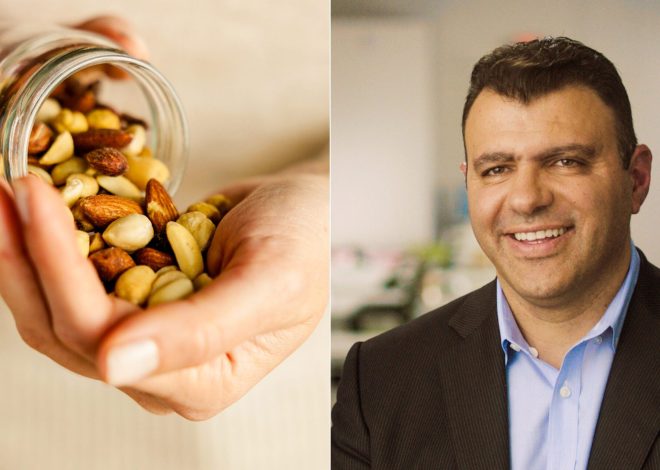
Nutrition and vitality: How fit vegetarians really are
BBoth legs on the floor, not leaning on the chair, bend your arm and then squeeze firmly with your hand. So hard that it shakes. Lea Böckstiegel is holding a hand dynamometer that measures grip strength – an indicator of overall muscle strength. She is a test subject in the largest study to date on plant-based nutrition in German-speaking countries.
Böckstiegel has been a vegetarian for about four years, avoiding meat and fish. And now she wants to reveal a lot about her life, her health and her eating habits: comprehensively and down to the gram. “I always wanted to take part in a study like this.” That’s no coincidence: Böckstiegel works at the Max Rubner Institute (MRI), the Federal Research Institute for Nutrition and Food in Karlsruhe. It is one of eight research centers of the so-called Coplant Study.
But that is not the reason for taking part, says Böckstiegel: “I find the content of the study exciting.” The researchers want to find out what effect nutrition has on health and fitness. Participants will of course find out the details: Is the right arm stronger than the left? What does the complete blood count look like – also in comparison to reference values? “You usually only get such laboratory values from the doctor,” says Böckstiegel.
The internet and libraries are full of nutritional tips and supposed findings about how eating habits affect the body and competitive sports. Bloggers, magazines and health insurance companies, for example, are getting involved. But while interest in vegan and vegetarian diets is constantly growing, there is little scientifically reliable data on the subject.
“People who eat a predominantly plant-based diet have a lower risk of many chronic diseases. Whether this also applies to a vegan diet has not yet been sufficiently investigated,” says Benedikt Merz, head of the Coplant study at the MRI. In larger cross-sectional studies, vegans were often not included. “In addition, with the easy availability of highly processed plant-based substitute products, we are faced with a completely new situation.” The German Nutrition Society also found in a study on the 14th DGE Nutrition Report that there is a need for further research.
According to a representative survey commissioned by the Federal Association of the German Food Trade (BVLH) last year, around four out of ten people describe themselves as flexitarians, meaning they consciously limit their meat consumption. Nine percent of the population are vegetarian, meaning they avoid meat and fish, but not eggs or milk and products made from them. Three percent are vegan, meaning they don’t eat any animal products at all. The avoidance of meat is particularly pronounced among women and those under 30, according to the survey.
Wide range of replacement products
In view of this, it is hardly surprising that meat consumption in Germany fell to 51.6 kilograms per capita last year, according to preliminary figures from the Federal Office for Agriculture and Food. Ten years previously, it was 61.6 kilograms.
On the other hand, the range of meat substitutes, plant-based drinks and other vegan foods is greater than ever. With the Coplant study, the researchers want to find out how their consumption affects the body in the long term, what happens to the metabolism when only certain or exclusively plant-based foods are eaten, and which diet is the healthiest and most sustainable.
Merz at the MRI says that the effects of individual ingredients in substitute products are known. But when they interact and over the long term, the matter is more complex.
Coordinated by the Federal Institute for Risk Assessment (BfR), a total of 6,000 test subjects aged between 18 and 69 who follow a vegan, vegetarian, pescetarian (fish, but no meat) or mixed diet are to be found for the study by 2027. In Karlsruhe, the researchers also want to include pregnant women, breastfeeding women and children.
Adults can expect two examinations lasting several hours, including a blood test, bone density measurement, urine and saliva samples. Among other things, the tests cover the absorption of nutrients, heavy metals and mold toxins, as well as an analysis of the intestinal microbiome. They also have to collect detailed data on their diet over a few days using an app. This includes stating whether raw or cooked carrots are on the table, and using kitchen scales to measure how many grams of apple are chopped into muesli.
Merz assumes that study participants will change their diet over the course of two decades, during which they will be interviewed and examined every few years. “The reality is that people change their diets.”
This is not a problem for science – because knowledge can be gained from this too. The fact that theses and older facts are being overturned is also part of it: preliminary studies have shown that a vitamin B12 deficiency is no longer a major issue among vegans, says Merz. Many people are aware of the problem and take nutritional supplements.
Test subject Böckstiegel experiences that meat-free diets are still a topic of discussion in 2024 when she comes home: “My grandma then asks me what she should make for dinner now.” When it comes to grilling, her family is so open-minded that they not only put meat-free sausages on the grill – but also try them themselves.

Ethel Purdy – Medical Blogger & Pharmacist
Bridging the world of wellness and science, Ethel Purdy is a professional voice in healthcare with a passion for sharing knowledge. At 36, she stands at the confluence of medical expertise and the written word, holding a pharmacy degree acquired under the rigorous education systems of Germany and Estonia.
Her pursuit of medicine was fueled by a desire to understand the intricacies of human health and to contribute to the community’s understanding of it. Transitioning seamlessly into the realm of blogging, Ethel has found a platform to demystify complex medical concepts for the everyday reader.
Ethel’s commitment to the world of medicine extends beyond her professional life into a personal commitment to health and wellness. Her hobbies reflect this dedication, often involving research on the latest medical advances, participating in wellness communities, and exploring the vast and varied dimensions of health.
Join Ethel as she distills her pharmaceutical knowledge into accessible wisdom, fostering an environment where science meets lifestyle and everyone is invited to learn. Whether you’re looking for insights into the latest health trends or trustworthy medical advice, Ethel’s blog is your gateway to the nexus of healthcare and daily living.






